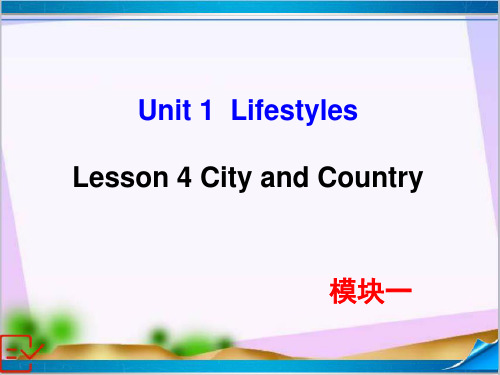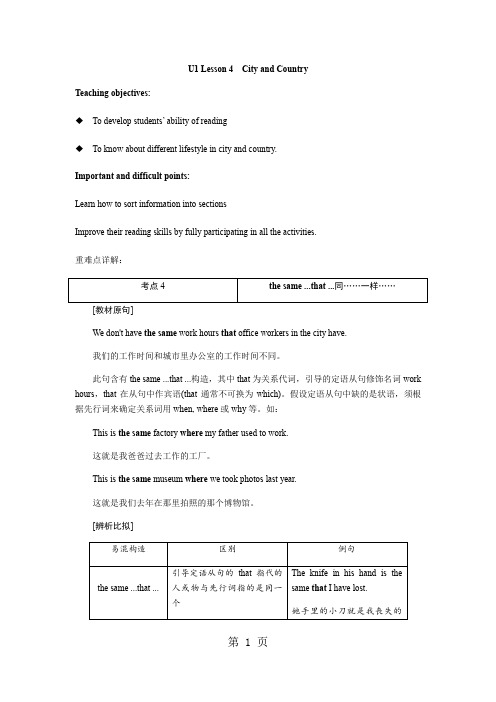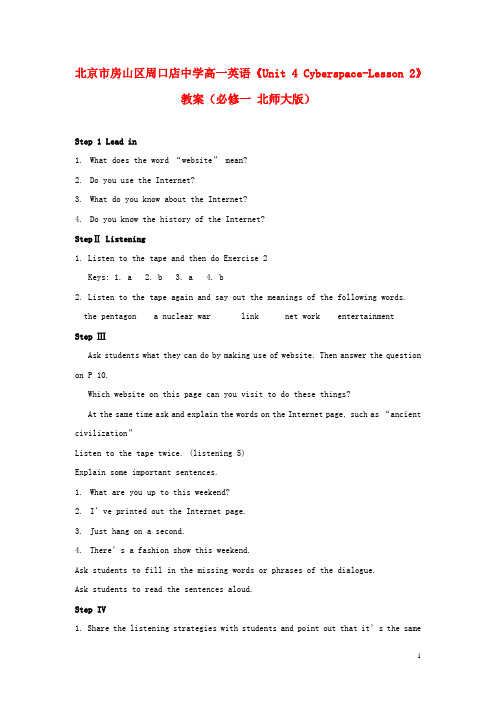高一英语必修1 Unit4教案(北师大版)
- 格式:docx
- 大小:13.98 KB
- 文档页数:4


U1 Lesson 4 City and CountryTeaching objectives:◆To develop students’ ability of reading◆To know about different lifestyle in city and country.Important and difficult points:Learn how to sort information into sectionsImprove their reading skills by fully participating in all the activities.重难点详解:[教材原句]We don't have the same work hours that office workers in the city have.我们的工作时间和城市里办公室的工作时间不同。
此句含有the same ...that ...构造,其中that为关系代词,引导的定语从句修饰名词work hours,that在从句中作宾语(that通常不可换为which)。
假设定语从句中缺的是状语,须根据先行词来确定关系词用when, where或why等。
如:This is the same factory where my father used to work.这就是我爸爸过去工作的工厂。
This is the same museum where we took photos last year.这就是我们去年在那里拍照的那个博物馆。
[辨析比拟]1.用适当的关系词填空①Today I use the same book that/as was used yesterday.②I visited their village in the same year when they visited ours.③He bought the same book as I had.2.完成句子④That is the same pen that_I_lost_on_the_campus(我在校园里丢的).⑤He got the same chance as_I_did(和我一样的).[教材原句]After a big breakfast in my house, I walk out of the front door and I'm already at work.在家里吃饱一顿早饭后,我走出前门,开场一天的工作。

Lesson 4 City and CountryWords and Phrases1.imagine想象,设想Can you imagine city and country lifestyles in Britain? 你能想象得出英国城市和乡村的生活方式吗?一、表示“想象”、“设想”、“以为”1.Imagine+n.You can imagine the situation there. 你可以想象那里的情况。
2.Imagine+V-ing。
I didn't imagine becoming (become) a teacher in my childhood.在童年时期,我并未想象成为一名教师。
I can't imagine my marrying (marry) a girl of that sort.我难以想象我与那种女子结婚后的情形。
Can you imagine Tom cooking (cook) dinner for twenty people?你能想象出汤姆为20个人做饭的样子吗?3. Imagine+that从句。
I imagine that you are tired from the journey.我料想你是由于旅行而疲劳了。
4. Imagine what/why/how/when….想象什么/为何/怎样/何时I can't imagine what he means.我想不出他的用意。
I can't imagine what he looks like. 我想象不出他是什么长相5. Imagine+n/pron.+(to be)n./adj.”Imagine yourself(to be)a teacher.想象一下你是一位老师。
I imagined the ship(to be)very large.我想象那船很大。
8. Imagine+n./pron.+as+n.”I imagined you as a big tall man.我以为你是个高大的人。

北京市房山区周口店中学高一英语《Unit 4 Cyberspace-Lesson 2》教案(必修一北师大版)Step 1 Lead in1.What does the word “website” mean?2.Do you use the Internet?3.What do you know about the Internet?4.Do you know the history of the Internet?StepⅡ Listening1. Listen to the tape and then do Exercise 2Keys: 1. a 2. b 3. a 4. b2. Listen to the tape again and say out the meanings of the following words.the pentagon a nuclear war link net work entertainmentStep ⅢAsk students what they can do by making use of website. Then answer the question on P 10.Which website on this page can you visit to do these things?At the same time ask and explain the words on the Internet page, such as “ancient civilization”Listen to the tape twice. (listening 5)Explain some important sentences.1.What are you up to this weekend?2.I’ve printed out the Internet page.3.Just hang on a second.4.There’s a fashion show this weekend.Ask students to fill in the missing words or phrases of the dialogue.Ask students to read the sentences aloud.Step IV1. Share the listening strategies with students and point out that it’s the samein our own language: Important words•Listen for words that are stressed. They are important words.•Do not worry if you do not hear all the other words.2. Students listen to the seven sentences on the cassette. Pause after each sentence for students to identify the stressed words. Then play the cassette for students to repeat the sentences.StepⅤ1. Ask each student to make notes of what he / she would like to do from Friday afternoon to Sunday afternoon.2. Revise telephone languages. Pay attention to some expressions different from Chinese ones.3. Ask students to work in pair phoning each other, talking about the plan at the weekend.Step VIAsk students to write a composition about the advantages and disadvantages of the Internet in their lives.。

Teaching Plan Name: XXXClass: XXXStudent No.: XXX Supervisor: XXXUnit one LifestyleLesson four City and CountryI. Teaching aims:a. Knowledge Goals:1) To practice using prediction reading strategy and reading for specific information;2) To know how to use words exactly to describe the two lifestyles;3) Learn to guess the new words’ meanings according to the context.b. Ability Goals:1) To express opinions orally and give reasons for them;2) To compare one lifestyle with another;3) Train the students to cooperate with each other.II. Language points and difficulties:1) Develop the ability of scanning;2) Learn to use pictures or title to get the idea of the passage;3) Use of some key words: accountant, tube, crowded, otherwise, forecast etc.III. Teaching methods and aids:1) Use brain-storm method to make the students involved in the topic;2) Group work to make the students exchange their ideas in the class;3) Scanning method to make the students get the general idea of the passage;4) Use the computer and the PPT to show.IV. Teaching procedures:Step 1 Warm-up: (Five minutes)1) Introduce today’s topic: “Lifestyle in city and country”;2) Let students think out as many adjectives as they can to describe them.Step 2 Lead-in: (Eight minutes)1) Give some pictures about the two lifestyles and ask the students to discuss two questions: How are city and country lifestyles different in China? Can you imagine city and country lifestyles in Britain?2) In these two lifestyles, which lifestyle is your favorite? Ask students to pick out one lifestyle and discuss.Step 3 Reading: (Twenty minutes)1) Introduce the reading strategies: prediction, and ask them to guess what the two articles are about;2) Read the text quickly again and fill in the table on P14;3) Focus on some key words and phrases, guess the meaning and then do some exercise in the class.Step 4 Optional activities: (Ten minutes)1) Work in pairs and find out your partners’ favor ite lifestyle;2) Choose some students to conclude today’s learning knowledge. Step 5 Homework: (Two minutes)1) Read the passage again and finish the exercises on P15;2) Write a short paragraph to introduce your lifestyle to your friends. Design of the blackboard writing:。

U1 Lesson 4 City and CountryObjectives:To practise using background knowledge strategies when reading. To practise reading for specific information. To express opinion orally and give reasons for them. To compare one lifestyle with another. Pre-ReadingAnswer these questions to prepare yourself. Use the Key Words below to help you.office, farm, underground, walk, crowded, space, quiet, noisy. 1) How are city and country lifestyles different in China? 2) Can you imagine city and country lifestyles in Britain?Show some pictures in the country and in the city.busy,dangerous, exciting, interesting,stressfulboring, easy, free, peaceful,relaxingReadingRead and fill in the table with information about Debbie and Paul’s lives. Add information about your own life and compare.Spacious and bright classroomHave computer classesThe school in the country is very old and shabbyThe school in the city is very modern and bright.Look at the chart then try to think out some words to describe the advantages and disadvantages living in the city or the country.Post-ReadingChoose the best answers:1.From the first paragraph of text 1, we can know that ___A. Debbie has to get up very early but Paul doesn’t have to.B .Debbie is rather tired of the underground.C .Debbie goes to work by car every day.D .Paul has to travel far away to work every day.2. In the last paragraph of text 2, it can be inferred that ___.A. Paul’s wife does not like moviesB. Paul often goes to see the filmC. The life of Paul is very convenientD. When Paul’s children see the tube, they will get very excited3. The main idea of text 2 is that ___.A. Paul lives in a small village in the north of EnglandB. It is easy for Paul to go to workC. Paul is busy but without the stress of lifeD. Paul’s life is very free4. Whose life is better, Debbie’s or Paul’s?A .Debbie’s. B. Paul’s. C. Both.D. Different people have different ideas.5. Which of the following is NOT true according to the texts?A. Debbie has to spend all morning checking numbers every day on workweeks.B. Debbie likes to go to the countryside to have a weekend break sometimes.C. Debbie and Paul are both movie fanatics and both see movies a lot.D. Paul likes all the crowds and the noise in London.Answers: BDCDCLanguages points:1. That’s what people call …He’s a new comer. That’s what I know about him.That’s how… That’s why… That’s where…2. …it’s so crowded that I can’t find …so …that…引导结果状语从句,如此…以至于…Anna works so hard that she has little time for rest.Tommy got up so late that he missed the first bus.3. I spend all morning checking numbers.spend some time doing sth. 花费时间做――I spend two hours doing my homework everyday.4. W e don’t have the same work hour that office workers in the city have. that 引导的从句表示的内容与主句所讲的是“同一”That’s the same purse that I bought last Sunday.对比That’s the same purse as I bought last Sunday. (同我丢失的那个一样,但不是同一个)5. Right now I am studying by distance learning.distance learning 远程教育6. …it’s my dream to see the Great Wall …不定式to see the Great Wall作真正的主语,前面的it是形式主语。
Unit1 Lesson4 名师教学设计(一)1教学目标Teaching Aims: a. Knowledge Goals:1) To practise using prediction reading strategy.2) To practise reading for specific information.b. Ability Goals:1) To express opinions orally and give reasons for them.2) To compare one lifestyle with another.3) Learn to guess the new words' meanings according to the context.c. Moral Goals:1) Help the students to form the correct life value.2) Train the students to cooperate with each other.2学情分析3重点难点I1. Key and Difficult Points:a. Teaching Important Points:1) Develop the ability of scanning.2) Learn to use pictures, title etc. to get the idea of the passage.b. Teaching Difficult Points:1) How to find the contextual connections using reading strategies.2) How to predict by using some background information.3) Form the correct life value and encourage the students to devote themselves to the countryside.4教学过程4.1 第一学时4.1.1教学活动活动1【活动】教学活动Step 6 Deal with new words and expressions. Individual work Check with the whole classStep 7 Read the texts carefully and fill in a table with specific information. Individual work Check with partners Check with the whole classStep 9 Use the table as clues to Practice retelling Debbie’s and Paul’s lifestyles Tell how Debbie’s and Paul’s lives are different.。
Unit1 Lifestyles-Lesson4 City and Country一、学习目标1. 能够谈论城市与乡村。
2.能够熟练掌握课文中的单词和句型。
二、重难点分析1. 掌握本课短语。
2. 理解文中重点句子。
三、学习过程Step1: Skim the text and get the main idea.(略读或浏览阅读,忽略不懂的句子和生词,快速阅读原文。
目的只是为了了解阅读材料的内容大意,不求甚解。
)Now read the text quickly and choose the best answer.(1)Which one of the following is true about Debbie?A. She needs to be at her office by eight o’clock so she usually gets up at six o’clock.B. It takes her about thirty minutes to go to work by tube.C. When she gets to her office, she is always very busy.D. On Monday nights, she goes to the gym to take exercise.(2)Which one of the following is true about Paul?A. He usually gets up at four o’clock every morning when it’s still dark.B. He has two children, two boys.C. He is studying English by distance learning.D. He often sees the film in his village.(3)Debbie does all activities except ________.A. learn to danceB. learn to singC. do exerciseD. learn French(4)What’s the main idea of the passage?A. It’s about the life in the city.B. It’s about the life in the country.C. It’s about Debbie’s and Paul’s life.D. Take Debbie and Paul as an example to tell us the difference between the city life and the country life.(提示:(1)C (2)A (3)B (4)D )Step2: Read the text carefully and fill in the blanks according to the text. Add information about your own life and compare.(提示:Qake-up time: 7 a.m. 4 a.m.; Job: an accountant a farmer; Working hours: 8 all day; Work(s) in: center of London north of England; Evening activities: dance classes, go the gym, French classes play with his children, study by distance learning; Special activities: go to the cinema, drive to the country and go walking there, go to London for a weekend break.)Step3: Language pointsThat’s what people call the underground in London.此句中,what引导__________ 从句。
Unit1 Lesson 4教案Teaching objectives:To practise reading for specific informationTo express opinions orally and give reasons for themTeaching procedures:ⅠWarm up:Before you startAsk students to think about and answer the questions:1.How are city and country lifestyles different in China?2.Can you imagine city and country lifestyles in Britain?Students will give their answers and teachers show some slides about countryside and city to make students compare themAdvantage of city:Shopping is easily done;entertainment;Convenient; Exciting Disadvantage of city: Crowded;Close to each other; Polluted air;Noisy; Dirty and dusty; Polluted water;Stressed and nervous: Tall buildings;Crowded street. Advantage of country: Endless fields;The vast countryside;Fresh air;Clean and fresh; Clear water;Free and relaxedDisadvantage of country: Distant, Remote CountrysideⅡReadingGuess what the two articles are about.Now read the texts quickly and check your guessesTask 1Find details for each of the main ideas.Relaxing weekendTask 2Do the exercise 4Students read the texts again and complete the table with information from them Students write down information about their own life in the tableStudents work in groups and talk about their life and compare their life with Debbie’s and Pauls.ⅢVoice your opinionFirst give the following materials to make students learn about city and country better. Country life, is walking through a field of hay, as dusk paints orange and purple hues on the sky above.The birds twitter and brood, streams babble and flow, horses graze and gallop, crops are sown and harvested without cease.Life in the country is much more exciting than many city-dwellers would like to believe. In particular: it does you good ...City Life is Greater Manchester's weekly listings and lifestyle magazine, covering areas such as clubbing, cinema, comedy, gay, food & drink, shopping, music, theatre, art, books, sport and travelCity life: a growing problem. What was life like inside the City walls?Inside the crowded Citywalls, fine houses belonging to merchants often stood next to squalid houses belonging ...Cities are the great havens for knowledge, culture, and social life.Cultures are found in cities because it takes a large population to support museums, concert halls, sports teams, and night-life districts.Which lifestyle do you prefer? Why?Give students some time to discuss each otherThen give others’ opinion about the questionsSome people like to live in big cities. They say city life is colorful, convenient and exciting. There are shopping malls or supermarkets everywhere, so you can buy anything you like, while in the country, shops are very far away from your house. It is difficult to do shopping. In cities, people enjoy themselves in many ways in their spare time, going to the cinemas or theatres, taking a walk in the park, or watching a footfall game…But others prefer to live in the countryside. They say cities are crowded with people and cars. It is noisy. While people are suffering from all kinds of noise, you can enjoy yourself by sitting on the hillside watching the cattle around you. And now cities are becoming dirtier and dirtier. Factories and cars send out poisonous gases, which pollute the air and sky over cities is often gray. Water pollution and white pollution are also big problems in cities. On the contrary, the sky is blue and water is clear in the country.Different people have different choice. Where would you like to live, in cities or in the country?ⅣVocabularyDo the exercise 5ⅤHomeworkWrite a compositionLife in city or countryWords: 100 or soUse your own language and tell the reason why you like the lifestyle.。
⾼中英语Unit1LifestylesLesson4同步教学案北师⼤版必修1⾼⼀必修⼀ Unit1 Lifestyles Lesson 4 同步导学案学习⽬标:1. To be able to talk about City Life and Country Life2. Master important words and key sentences in the text and use them freely 重点难点:1. Develop reading ability2. To understand the long and difficult sentences学法指导:1. 通读课⽂,理解⽂章⼤意。
2. 再次细读课⽂,理解细节内容。
知识链接:了解城市⽣活与乡村⽣活的不同。
学习过程:Step1: Skim the text and get the main idea .(⽅法导引:略读或浏览阅读,忽略不懂的句⼦和⽣词,快速阅读原⽂。
⽬的只是为了了解阅读材料的内容⼤意,不求甚解。
) Now read the text quickly and choose the best answer.1. Which one of the following is true about Debbie?A. She needs to be at her office by eight o’clock so she usually gets up at six o’clock.B. It takes her about thirty minutes to go to work by tube.C. When she gets to her office, she is always very busy.D. On Monday nights, she goes to the gym to take exercise.2. Which one of the following is true about Paul?A. He usually gets up at four o’clock every morning when it’s still dark.B. He has two children, two boys.C. He is studying English by distance learning.D. He often sees the film in his village.3. Debbie does all activities except _______.A. learn to danceB. learn to singC. do exerciseD. learn French4. What’s the main idea of the passage?A. It’s about the life in the city.B. It’s about the life in the country.C. It’s about Debbie’s and Paul’s life.D. Take Debbie and Paul as an example to tell us the difference between the citylife and the country life.Step2: Read the text carefully and fill in the blanks according to the text. Add information about your own life and compare. PaStep3:Language points1.How does she feel about her work in Inner Mongolia? (Lesson 3)How does sb. feel about …?某⼈认为…怎么样?归纳拓展:What ________________________________?How_________________________________?2.That’s what people call the underground in London.此句中,what引导__________ 从句。
高一英语必修1 Unit4教案(北师大版)本资料为woRD文档,请点击下载地址下载全文下载地址课件www.5y
2.imagine
imagineimaginesth."想象某事",imagine
sb.doingsth."想象某人做某事";imagine+从句,"想象……"等
Smallchildrenalwaysimaginevisitingotherplanets】imagination不可数名词,"想象力;想象";
imaginaryadj."虚构的";
imaginativeadj."想像力丰富的"。
3.average
.averagen."平均数;平均水平"。
Thericecropsthisyearisabovetheaverage.
2.averagev."求……的平均数;平均分配"。
Pleaseaverage5and7,andtellmetheresult.
below/abovetheaverage"低于或高于平均水平";onaverage"平均地"。
Herrecordisabovetheaverageinherclass.
Ispendtwohoursinplayingcomputergamesadayonaverage.
4.view
come
intoview"出现在视野中";
atfirstview"初看,一见就……";
inone’sview=inone’sopinion"依照某人看来";
inviewof"鉴于,考虑到,由于"。
etrue
Sthcometrue
withhisdreamcomingtrue,hebeganhiscareerasadoctorint hehospital.
6.hangon"别挂断"
"坚持下去;取决于,依赖于
justhangon;yourunclewantstotalktoyou.
Icansaythatone’ssuccesshangsonhisorherattitude.
hang表示"悬挂"时,过去式和过去分词都是hung;表示"绞死,吊死"讲时,过去式和过去分词却是"hanged"。
例如: Afullmoonhungintheskylastnight.
hangup"挂起来;挂断;耽误";hangback"犹豫不前";hangaround"悠闲;等着"。
6.beupto做,从事于,由某人决定;是某人的职责,胜任
whataretheyuptothissummer?
Itisuptoustoprotectourownenvironment.
Thegraduateisn’tuptohernewjobforlackofexperience.
Thepriceofmeathasrisenupto
30yuanakilo.
7.suggest
表示"建议",后面可以接动名词或从句:suggestdoingsth."建议做某事";suggest+从句,从句的谓语由"+动词原形"构成。
例如:
Shesuggestschangingthetopicofmyspeechnextweek.
suggest"表明,暗示"的意思,后面接从句时,谓语部分要用陈述语气。
例如:
Herlettersuggeststhatsheisnotangrywithmeforbeinglat e
8.aswellas
"同,也,不但……而且……",用作连词。
mary,aswellasTom,washavingbreakfastintheclassroom.
Aswell放句末
IlikeEnglishandchineseaswell。
课
件www.5y 。